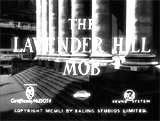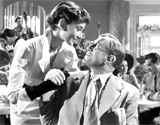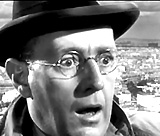
|
The Lavender Hill Mob (1951,
UK)
Charles Crichton's Ealing Studios' crime-caper
comedy concluded with the unlikely pursuit of English schoolgirls
to retrieve six golden miniature Eiffel Towers - it was one of four
Ealing Studio's comedies at mid-century, including Kind Hearts
and Coronets (1949), The Man in the White Suit (1951), and The
Ladykillers (1955), and
it won the Oscar for Best Writing, Story and Screenplay (T.E.B. Clarke):
- in the opening sequence, prim, mousy and timid bank
clerk Henry Holland (Oscar-nominated Alec Guinness) was dining
in a fancy restaurant in Rio de Janiero next to a pipe-smoking
British gentleman, where he met Chiquita (Audrey Hepburn in her
screen debut, with a very short walk-on role) and gave her money
for a birthday present

|

|
|
Henry Holland Dining in Rio Restaurant
|
- Holland expressed pleasure
at having had a superb year, and then he flashbacked to his work
in the Bank of England with 20 years of service in the transport
and shipment of gold bullion ingots from a refinery to the bank:
("One superb year. Just when I was beginning to believe I'd never achieve
it. For 20 years, I've dreamed of a life like this. For 19 of those
years, fate denied me the one contact essential to the success
of all my plans. Still, I never quite lost sight of the goal, inaccessible
as it often seemed to me when I was merely a, merely a non-entity.
Among all those thousands who flock every morning into the city.
Most men who long to be rich know inwardly that they will never
achieve their ambition. But I was in the unique position of having
a fortune literally within my grasp. For it was my job to supervise
the deliveries of bullion from the gold refinery to the bank")
- in a continuing flashback, he mused in voice-over
about his poorly paid job - and how he might finally become rich:
("Many a rascal would have risked his all for half a million, not realizing
that gold, in the form of bullion, is useless without a method of
smuggling it abroad. To find that method was my last remaining problem...Meanwhile,
I gave the bank their gold....I was a potential millionaire, yet
I had to be satisfied with eight pounds, fifteen shillings, less
deductions. A weekly reminder that the years were passing, and my
problem still unsolved. Until my ship came home, I was obliged to
live at the Balmoral private hotel in Lavender Hill")
- his solution to his impoverished
life was to commit the "perfect"
crime, by stealing gold bullion from the shipments and melting down
the gold bars - he met up with his potential cohort-in-crime Alfred
Pendlebury (Stanley Holloway), an artist in his Balmoral-Lavender Hill
boarding house; the eccentric Alfred operated a foundry that could
convert over £1 million pounds of gold into souvenir Eiffel
Tower paperweights to be exported (smuggled) out of the country to
France from England without detection; Pendlebury was the perfect partner,
since he could utilize his current Eiffel Tower paperweight molds (for
standard leaden souvenir statues), and ship the disguised golden paperweights
(painted black) to his Paris distribution network
- they recruited two other petty Cockney crooks to
aid in the robbery scheme: Lackery Wood (Sidney James) and Shorty
Fisher (Alfie Bass)
- Holland and Pendlebury traveled across the English
Channel to supervise the transport of the
golden statues to a gift shop located at the top of the Eiffel
Tower; to their horror, they realized that a souvenir shopkeeper
at the Parisian kiosk (on the upper level of the Eiffel Tower)
had sold six of the gold-converted Eiffel Tower statues from a
crate specially-marked R that she wasn't supposed to open; Holland
rushed to the elevator to watch as a group of British schoolgirls,
who had accidentally bought six of the statues, descended in the
Tower elevator
-
in a riotous sequence, Holland and Pendlebury chased after them down
a dizzying, Vertigo-inspired, winding circular staircase,
to try to reach the ground level before the elevator did
- there was a zany wild goose chase sequence after
the British schoolgirls from Paris to London, and although five
statues were recovered and bought back, the 6th one ended up
at London's Hendon Police Training College in a display of police
history; Holland grabbed the statue, instigating another crazy
and confused, mad-cap police pursuit in squad cars after the bullion
robbers; Holland humorously broadcast false directional
radioed reports from a stolen police car
- in the concluding surprise revelation, Holland revealed
that he had escaped to Rio de Janeiro with the six statues worth
25,000 pounds, and enjoyed his new lifestyle for one year until
the money ran out: ("I came straight on to Rio de Janeiro
- 'Gay spritely land of mirth
and social ease'... Enough to keep me for one year in the style to which I was, ah, unaccustomed");
but then as he left the restaurant in the film's major plot twist,
his left hand was shown handcuffed during the telling of his entire
flashbacked story to his British dining partner - a police officer
|

Henry Holland's Flashback About Being a London Bank Clerk
for 20 Years Transporting Gold Bullion

Voice-Over: "I was a potential millionaire..."

Holland's Opportune Meeting Up With Fellow Lavender
Hill Boarder Pendlebury


Shock That The Eiffel Tower Kiosk Shopkeeper Had Sold
6 Statues

British Schoolgirls Descending in an Eiffel Tower
Elevator

False Directional Reports During Getaway
|








